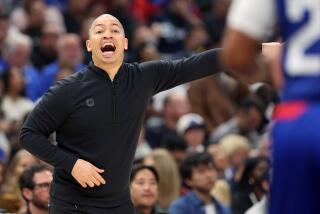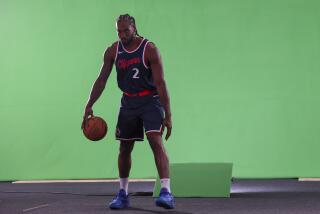Owners Get TV Money, but Might Not Keep It
- Share via
Remember those people who laughed when summer ran into fall and the Clippers still didn’t have a coach? They laughed, too, when it was suggested that a team didn’t need a coach if there wasn’t going to be a season.
Now with the end of the year nearly here, there isn’t much laughter or holiday cheer in the halls of the NBA.
For the record:
12:00 a.m. Dec. 19, 1998 For the Record
Los Angeles Times Saturday December 19, 1998 Home Edition Sports Part D Page 9 Sports Desk 1 inches; 14 words Type of Material: Correction
Pro basketball--Player agent Arn Tellem’s name was misspelled in a photo illustration Friday.
There is still no season and the Clippers look like the smartest of the whole dumb bunch.
Sort of.
Even though they don’t have to pay a coach for this season, they are still paying the coach from last season, shelling out $4 million in the next two years to Bill Fitch, who was fired in April.
But if you believe some of the grumbling players, the Clippers can afford it because they are making a nice profit from the lockout that threatens to destroy the entire season. There’s a perception among some of the union faithful that the players are being denied income while the owners are contentedly sitting on their huge television revenues.
Like most issues in this bitter standoff, there are no simple answers.
But there are plenty of questions:
* Is it true that the owners continue to get their national television money from NBC and Turner Broadcasting?
Yes, but as one unnamed source--they all have to remain unnamed because nobody in authority is allowed to talk about this stuff--put it, “It’s money with strings attached.”
The NBA is operating under a four-year, $2.6-billion national TV deal into which NBC puts $1.75 billion and Turner $890 million.
With 29 clubs, that comes out to about $22 million per team per year, payable in monthly installments during the season, which the clubs are receiving.
The contract stipulates, however, that the league must make up for lost telecasts. The teams just don’t know what that means. At this point, nobody seems to.
If there is no season, each club could be asked to give back its $22 million. More likely, the teams would simply receive far less in each of the remaining years of the deal.
Even if the season should start as late as Feb. 1--considered the absolute outer limit for even a semi-acceptable season--the number of telecasts to make up might be manageable if the NBA crams more games into the remaining time and extends the season to, say, July.
At this point, Turner has lost more. If there should be no NBA finals, NBC will lose more.
But unless the NBA goes out of business altogether, don’t look for the teams to give back any of their national television money.
* Aren’t the teams saving tremendously in salary?
So far. The Lakers have a payroll of $38,044,760 for 11 players. The Clippers are at $25,613,790 for a dozen.
Since the lockout began July 1, neither club has shelled out a penny in player payroll.
It is widely assumed that, if this season is salvaged, the players’ salaries will be prorated.
The players, of course, have other ideas and as part of any settlement, much of that payroll money will probably find its way into the players’ bank accounts.
* What are the teams’ other expenses and savings?
Although the Lakers and Clippers are receiving their national television money, they are not getting regional broadcast money. For the Lakers, that’s about $20 million. For the Clippers, it’s about $5 million.
The Clippers also are saving their rent at the Sports Arena, which comes to $15,000 a game.
Both teams are maintaining front-office staffs. In the case of the Lakers, the most expensive employees are General Manager Jerry West at $3.5 million a year, Coach Del Harris at about $1.6 million a year, the assistant coaches at $1.5 million, the scouting staff at $400,000, and trainer Gary Vitti at more than $100,000.
The Clippers pay General Manager Elgin Baylor about $500,000, and Vice President Andy Roeser also is highly compensated.
Both teams get money from NBA Properties, limited though merchandise sales may be in this non-season. But both also have had to return season-ticket money for games not paid, at a 6% interest rate.
So when you finish all the adding and subtracting, both clubs are saving their huge player payrolls and banking their national television money--for now.
But they are not selling the product--and all of the byproducts--to paying customers. It is estimated that the Lakers bring in a gross revenue of $90 million a season.
And the longer the lockout continues, the harder it will be to lure those customers back. Eventually, the national TV money could go the way of the customers.
And the Clippers won’t need a coach after all.
As the NBA season ticks away, so too does Shaquille O’Neal’s $15 million salary for the 1998-99 season. Watch how quickly his lost dollars add up on The Times’ Web site’s Shaq-O-Meter: https://www.latimes.com/shaqometer
(BEGIN TEXT OF INFOBOX / INFOGRAPHIC)
NBA Lockout / Day 171
A look at the NBA lockout through Thursday:
Total days of season missed: 45.
* Games lost Thursday: 4.
* Total games lost: 310.
* Earliest estimated date season can start: Jan. 22.
* Negotiations: Nothing scheduled.
* Projected player salary losses (through Jan. 22): $480 million.
* Today’s best canceled game: Lakers at Minnesota. Shaq and Kobe against Kevin and Stephon on TNT.
* Quote of the day: “I urge you to focus on the extent of the compromises the owners have made from their initial bargaining demands.”--Commissioner David Stern in a nine-page letter mailed to all NBA players.
More to Read
Go beyond the scoreboard
Get the latest on L.A.'s teams in the daily Sports Report newsletter.
You may occasionally receive promotional content from the Los Angeles Times.






